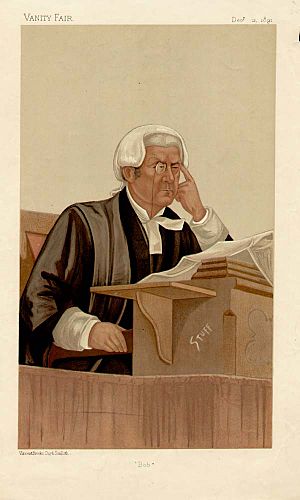Robert Romer facts for kids
Quick facts for kids
Sir Robert Romer
|
|
|---|---|

"Bob", Vanity Fair caricature, 1891
|
|
| Lord Justice of Appeal | |
| In office 27 February 1899 – 24 October 1906 |
|
| Justice of the High Court | |
| In office 17 November 1890 – 27 February 1899 |
|
| Personal details | |
| Born | Kilburn, Middlesex, England |
Sir Robert Romer (born December 23, 1840 – died March 19, 1918) was an important British judge. He was a High Court judge from 1890 to 1899. After that, he became a Lord Justice of Appeal from 1899 to 1906. During this time, people knew him as Lord Justice Romer. He was a very respected person in the legal world.
Contents
The Early Life of Robert Romer
Robert Romer was born in Kilburn, which is in Middlesex, England. He went to St John's School, Leatherhead when he was younger. Later, he studied at Trinity Hall, Cambridge University. He was extremely good at mathematics there. In 1863, he achieved the highest score in the mathematics exam, becoming the Senior Wrangler. This was a big achievement for his college. He also won a special award called Smith's Prize that same year.
Romer's Time as a Professor
After university, Romer briefly worked as a professor. He taught mathematics at Queen's College in Cork. He stayed there from 1865 to 1866. Even though he was a talented mathematician, his main career path would be in law.
Robert Romer's Legal Career
Robert Romer became a Queen's Counsel (QC) in 1881. This title means he was a very experienced and respected lawyer. In 1884, he became a bencher of Lincoln's Inn. This is one of the four professional associations for barristers in England.
Becoming a High Court Judge
In 1890, Robert Romer was appointed a High Court judge. He worked in the Chancery Division. This part of the court deals with complex business and property cases. When he became a judge, he also received the title of Knight. He served as a High Court judge for nine years.
Becoming a Lord Justice of Appeal
In 1899, Romer was promoted to a Lord Justice of Appeal. This is a very high position in the British legal system. He took over from another famous judge, Joseph William Chitty. He continued in this role until 1906, when he decided to retire.
Awards and Recognition
Robert Romer received many honors during his life. In 1899, he became a member of the Privy Council. This is a group of important advisors to the British monarch. In the same year, he was also chosen as a Fellow of the Royal Society. This means he was recognized for his contributions to science, even though he was a lawyer.
Knight Grand Cross of the Order of the Bath
On January 1, 1901, Romer received a very special award. He was appointed a Knight Grand Cross of the Order of the Bath (GCB). This is one of the highest honors in the United Kingdom. King Edward VII himself presented him with this award in February 1901.
Public Service and Commissions
Beyond his work as a judge, Robert Romer also served on important public commissions. In 1901, he was part of the Royal Commission on South African Hospitals. This commission looked into the hospitals during the Boer War. Later, in 1909, he was a member of the Royal Commission on University Education in London. This group studied how universities in London could be improved.
Robert Romer's Family Life
In 1864, Robert Romer married his cousin, Betty Lemon. Her father, Mark Lemon, was the editor of a famous magazine called Punch. Robert and Betty had several children. Two of their sons, Mark Romer and Cecil Romer, also became important figures. His grandson, Sir Charles Robert Romer, followed in his footsteps and also became a Lord Justice of Appeal. Their daughter, Helen Mary, married Frederic Maugham, who later became a Lord Chancellor.
Images for kids
 | Sharif Bey |
 | Hale Woodruff |
 | Richmond Barthé |
 | Purvis Young |


